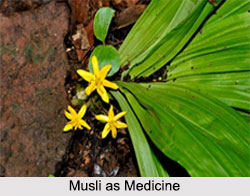 Musli or Hypoxis Orchioides is a rare herb from India. It is used in traditional systems of medicine including Ayurveda, Unani and Homeopathy. It is traditionally used for arthritis, cancer, diabetes, boosting vitality, improving sexual performance and for many other uses.
Musli or Hypoxis Orchioides is a rare herb from India. It is used in traditional systems of medicine including Ayurveda, Unani and Homeopathy. It is traditionally used for arthritis, cancer, diabetes, boosting vitality, improving sexual performance and for many other uses.
Benefits of Musli
The tuberous roots of this plant are considered alterative, tonic, restorative and useful in piles, debility and impotence. The Raja Nirghantu mentions two varieties of musli, namely, white and black. The properties of the white variety are said to be inferior to those of the black which is preferred for use as an alterative tonic.
Dose of Mushali in Medicine
Musli enter into the composition of several medicines intended to act as aphrodisiacs and restoratives. The following in an example; take the root of Asparagus racemosus (satavari), Sphoeranthus mollis (munditika), gulancha, seeds of Butea frondosa (hastikarna), and the tuberous roots of musli, equal parts; powder and mix. Dose should be about a drachm with honey or clarified butter, in the debility of old age.
The roots of Bombax Malabaricum and Asparagus racemosus are sometimes sold by the native druggists of Kolkata under the name of "Safed Musli". The dried roots were probably considered a separate variety, namely, the white by the ancients.
This article is a stub. You can enrich by adding more information to it. Send your Write Up to content@indianetzone.com
Related Articles
Ayurveda
Sushruta Samhita
Classification of Medicine
Properties of Material Objects and its Effect on Human Body
Indian Herbs
Traditional Indian Medicines




















